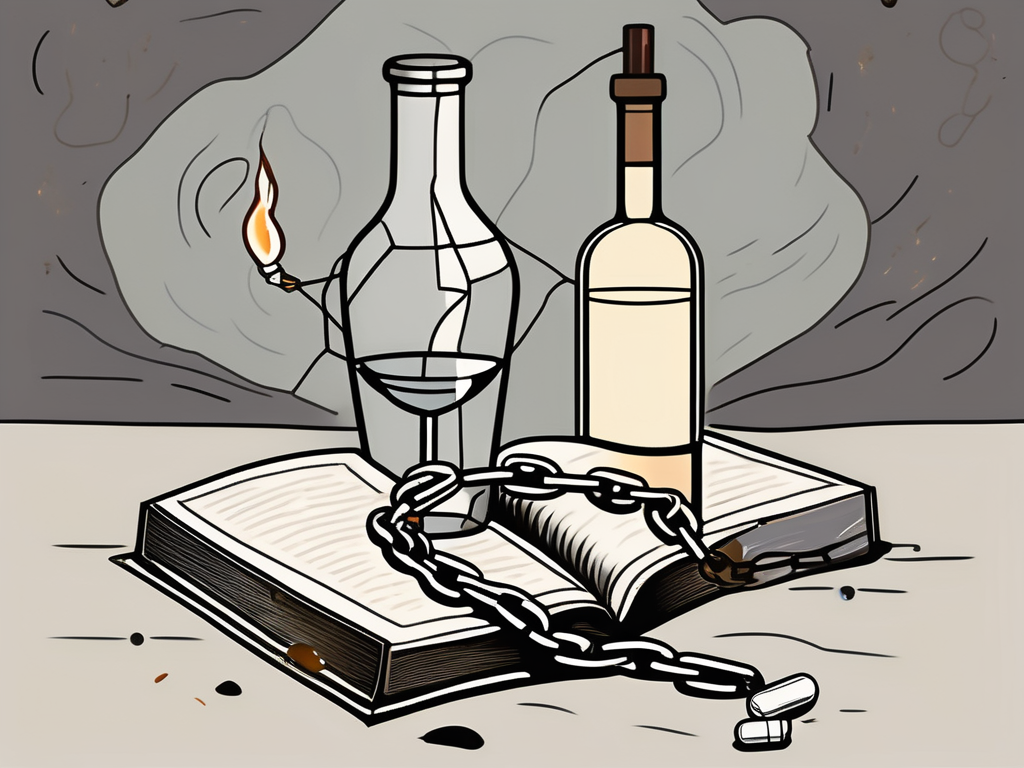Addiction is a complex and challenging issue that affects countless individuals and their loved ones. It can take various forms, such as substance abuse, gambling, or even unhealthy relationships. In the face of such struggles, many people turn to their faith and seek guidance from religious texts like the Bible. So, what does the Bible say about addiction? Let’s explore this topic from a biblical perspective and uncover the insights it offers.
Understanding Addiction from a Biblical Perspective
Before we delve into the specific teachings of the Bible regarding addiction, let’s establish a foundational understanding of addiction from a biblical standpoint. Addiction can be defined as the bondage or enslavement to a certain behavior or substance that hinders one’s ability to live in alignment with God’s will. It is characterized by an overwhelming compulsion and a lack of control.
When we think about addiction, it is important to recognize that it goes beyond just the physical aspect. Addiction affects our mind, body, and spirit. It is a complex issue that can have profound consequences on our relationships, our health, and our overall well-being. Understanding addiction from a biblical perspective allows us to approach it with compassion, grace, and a desire for restoration.
Defining Addiction in Biblical Terms
In biblical terms, addiction is often referred to as bondage to sin. It is the state of being ensnared by something that leads us away from the path of righteousness. It can manifest as an idolatrous attachment to worldly pleasures, causing us to prioritize them over our relationship with God.
When we become addicted to something, whether it be drugs, alcohol, gambling, or any other destructive behavior, we are essentially placing that thing above God in our lives. It becomes our focus, our obsession, and it consumes our thoughts and actions. This bondage to sin not only separates us from God but also hinders our ability to experience the abundant life that He desires for us.
However, it is important to note that addiction is not limited to substances or behaviors that are traditionally seen as sinful. We can become addicted to seemingly harmless things such as work, social media, or even our own self-image. Anything that takes control of our lives and becomes a barrier between us and God can be considered an addiction.
The Bible’s View on Substance Abuse
When it comes to substance abuse, the Bible emphasizes the importance of self-control and the stewardship of our bodies. The Apostle Paul reminds us in 1 Corinthians 6:19-20 that our bodies are temples of the Holy Spirit and that we should honor God with them. This serves as a stark reminder that substance abuse is incompatible with our role as bearers of God’s presence.
Substance abuse not only harms our physical health but also affects our mental and spiritual well-being. It clouds our judgment, distorts our perception, and hinders our ability to make wise decisions. It can lead to broken relationships, financial struggles, and a loss of purpose and meaning in life.
However, the Bible also offers hope and healing for those struggling with addiction. It teaches us that through the power of Christ, we can find freedom from the bondage of sin. In Romans 6:14, it says, “For sin shall no longer be your master, because you are not under the law, but under grace.” This verse reminds us that we are not defined by our past mistakes or addictions, but by the grace and love of God.
God’s desire is for us to live in freedom, to experience His love and grace in every aspect of our lives. He offers us the strength to overcome addiction, to break free from the chains that bind us, and to walk in the freedom that comes from a restored relationship with Him.
Understanding addiction from a biblical perspective is not about judgment or condemnation, but about recognizing the destructive nature of addiction and seeking God’s guidance and healing. It is about surrendering our lives to Him, allowing Him to transform us from the inside out, and finding true freedom in His love and grace.
Biblical Passages Addressing Addiction
Throughout the Bible, there are numerous verses that address the issue of addiction and offer insights on how to overcome it. Let’s explore some of these passages and their teachings.
Old Testament References to Addiction
In the Old Testament, we find stories of individuals wrestling with addiction-like struggles. The Israelites, for instance, were repeatedly enticed by idol worship, falling into a cycle of sin and repentance. These narratives serve as cautionary tales, warning us against the consequences of giving in to our addictive tendencies.
One such story is that of King Solomon, known for his wisdom but also for his struggles with addiction. Despite his great knowledge, Solomon allowed his heart to be led astray by his many wives, who worshiped foreign gods. This led him to build altars and temples to these gods, ultimately causing him to lose sight of the one true God. Solomon’s story teaches us the dangers of allowing our desires to control us, as it can lead us down a path of destruction.
Another example is the story of Samson, a man blessed with incredible strength but plagued by his addiction to lust and desire for revenge. Samson’s downfall came when he fell in love with Delilah, a woman who betrayed him and handed him over to his enemies. His story serves as a reminder that even those with great strength can be brought down by their addictive behaviors if they are not careful.
New Testament Teachings on Addiction
In the New Testament, Jesus emphasizes the significance of inner transformation and freedom from sin. He speaks of the need to be born again spiritually and encourages us to turn away from our old ways. Through His teachings, we learn that true liberation from addiction comes from surrendering our lives to Him and allowing Him to work within us.
Jesus’ encounter with the Samaritan woman at the well is a powerful example of His transformative power over addiction. The woman had a history of failed relationships and was living in a state of spiritual thirst. Jesus offered her living water, symbolizing the eternal satisfaction that can only come from a relationship with Him. Through this encounter, the woman’s life was forever changed, and she became a witness to others of the transformative power of Jesus.
The apostle Paul, in his letters to the early Christian communities, also addresses the issue of addiction. In his letter to the Corinthians, he warns against the dangers of idolatry and the temptation to worship false gods. He encourages believers to flee from anything that could lead them astray and to find their satisfaction and fulfillment in Christ alone.
Furthermore, Paul speaks of the importance of renewing our minds and being transformed by the renewing of our thoughts. This process involves actively seeking God’s truth and allowing it to replace the lies and destructive patterns of thinking that often accompany addiction. Through this renewal, we can experience true freedom from the chains of addiction.
In conclusion, the Bible provides us with valuable insights and teachings on addiction. From cautionary tales in the Old Testament to the transformative power of Jesus in the New Testament, we are reminded that true liberation from addiction comes from surrendering our lives to God and allowing Him to work within us. May we seek His guidance and strength as we navigate the challenges of addiction and find hope in His promises of healing and restoration.
The Role of Free Will in Addiction According to the Bible
One of the key aspects the Bible addresses regarding addiction is the role of free will. Let’s explore how the concept of free will relates to addiction.
The Concept of Free Will in the Bible
In the Bible, free will is considered a God-given gift that grants us the ability to make choices. We are not forced into addictive behaviors; rather, we have the freedom to decide whether to indulge in them or not. This highlights the responsibility we hold in our journey towards overcoming addiction.
When we consider the concept of free will, we must also acknowledge that it is not a license to engage in destructive behaviors. Instead, it is an invitation to exercise wisdom and discernment in our choices. The Bible teaches us that our decisions have consequences, and it is through the exercise of free will that we can navigate the complexities of addiction.
Furthermore, the concept of free will in the Bible emphasizes the importance of personal accountability. We are called to take ownership of our actions and recognize that our choices have a direct impact on our well-being and the well-being of those around us. By acknowledging the power of free will, we can actively work towards breaking free from the chains of addiction.
How Free Will Contributes to Addiction
While free will allows us the power to make choices, it also means that we can succumb to the allure of addictive behaviors. Addiction can be seen as the result of repeatedly making choices that lead us down destructive paths. Recognizing this truth reminds us of the importance of exercising wisdom and self-discipline when confronted with temptations.
When we exercise our free will, we must be aware of the potential consequences of our actions. Addiction often begins with a seemingly innocent choice, but over time, it can spiral out of control. The Bible warns us about the dangers of indulging in sinful desires, as they can lead to bondage and enslavement.
However, it is essential to remember that the Bible also offers hope and redemption. While addiction may seem insurmountable, the power of free will allows us to choose a different path. Through faith, prayer, and seeking support from others, we can find the strength to overcome addiction and experience true freedom.
Moreover, the concept of free will reminds us that we are not alone in our struggle against addiction. God’s grace and guidance are available to us, providing the necessary strength to resist temptation and break free from the chains of addiction. By embracing our free will and aligning our choices with God’s will, we can find healing and restoration.
The Bible’s Guidance on Overcoming Addiction
Thankfully, the Bible provides us with guidance and principles to help us overcome addiction. Let’s explore some of these biblical teachings.
Biblical Principles for Recovery
One principle we find in the Bible is the importance of seeking wise counsel and accountability. Proverbs 11:14 reminds us that in a multitude of counselors, there is safety. Connecting with a supportive community can provide invaluable guidance and encouragement in the journey towards recovery.
When facing addiction, it can be easy to feel alone and overwhelmed. However, the Bible encourages us to reach out and seek the wisdom of others who have walked a similar path. By surrounding ourselves with a network of supportive individuals, we can gain insights and strategies for overcoming addiction.
Moreover, accountability is crucial in the recovery process. The Bible teaches us that we are not meant to face our struggles alone. By opening up to trusted friends or mentors, we can find the strength to confront our addiction and make positive changes in our lives.
The Role of Faith in Overcoming Addiction
Faith plays a vital role in overcoming addiction. The Bible teaches us that with God, all things are possible (Matthew 19:26). Through faith, we can find the strength to break free from the grips of addiction and experience lasting transformation.
When battling addiction, it is common to feel hopeless and trapped. However, the Bible reminds us that God is greater than any challenge we may face. By placing our trust in Him, we can tap into His power and find the courage to overcome addiction.
Furthermore, faith provides us with a sense of purpose and meaning. The Bible teaches us that we are created for a greater purpose, and addiction hinders us from fulfilling that purpose. By surrendering our addiction to God, we can discover a renewed sense of identity and find fulfillment in living out His plan for our lives.
In addition, faith offers us a source of hope and comfort. The journey towards recovery can be filled with ups and downs, but knowing that we have a loving and compassionate God who walks alongside us can bring us peace in the midst of the storm. Through prayer and seeking God’s guidance, we can find solace and strength to persevere in our recovery journey.
The Church’s Role in Supporting Addicts
The church community has a significant role to play in supporting individuals struggling with addiction. Let’s explore the biblical instructions for the church in this regard.
Biblical Instructions for the Church Community
Galatians 6:2 instructs us to bear one another’s burdens, demonstrating the importance of empathy and support within the church. The church should serve as a safe space where individuals can seek help, find encouragement, and experience the love and compassion of fellow believers.
Spiritual Support for Those Struggling with Addiction
Spiritual support is crucial for those battling addiction. The Bible encourages us to turn to God in times of struggle and to draw strength from His presence. Through prayer, worship, and the study of Scripture, individuals can find solace, healing, and restoration.
In conclusion, the Bible offers profound insights and guidance regarding addiction. It underscores the importance of recognizing addiction as bondage to sin and encourages us to seek freedom through surrendering our lives to God. By embracing the principles, support, and wisdom found in the Bible, we can navigate the challenges of addiction, find hope in the midst of struggle, and discover a pathway towards lasting recovery.












